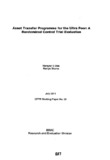| dc.contributor.author | Das, Narayan C | |
| dc.contributor.author | Shams, Raniya | |
| dc.date.accessioned | 2019-12-05T09:31:17Z | |
| dc.date.available | 2019-12-05T09:31:17Z | |
| dc.date.issued | 2011-07 | |
| dc.identifier.citation | Das, N. C., & Shams, R. (2011, July). Asset transfer programme for the ultra poor: a randomized control trial evaluation. Research Reports (2010): Economic Studies, Vol - XXVII, 27–59. | en_US |
| dc.identifier.uri | http://hdl.handle.net/10361/13218 | |
| dc.description.abstract | Challenging the Frontiers of Poverty Reduction (CFPR), an innovative approach to address extreme
poverty, was launched in 2002 in rural Bangladesh. Evaluation of the first phase of the programme
revealed that livelihoods of the participant households improved remarkably due to the intervention. But
a number of shortcomings were identified regarding the evaluation method of the first phase, particularly
due to adopting non-experimental evaluation design. This paper provides further evidence on the
effectiveness of CFPR using randomized control trial design, which efficiently addressed much of the
data limitation of earlier studies. Using 2007-09 panel data, this paper shows that the programme
reduced the vulnerability of the participant households by raising their food expenditure and preparing
livelihood pathways for them by generating self-employment and productive asset base including
financial, physical and human capital. Remarkable effect on per capita income was observed. Positive
impacts on natural assets like land acquisition through mortgaged-in, physical assets like livestock,
financial assets like borrowing from NGOs, accumulation of savings and lending out in terms of cash or
in kind have also been observed. However, evaluation shows that the programme did not have visible
impact on education, a finding which is almost similar to the short-run evaluation of the CFPR phase I.
This is probably not surprising because the programme does not provide any direct support on
education. However, given that income of the participant household is increasing over time at an
impressive rate, this may translate into human capital development through increase in education
expenditure in the long-run. | en_US |
| dc.language.iso | en | en_US |
| dc.publisher | BRAC | en_US |
| dc.subject | Ultra poor | en_US |
| dc.subject | Poverty | en_US |
| dc.subject | BRAC | en_US |
| dc.subject.lcsh | Poor--Bangladesh--Finance, Personal. | |
| dc.subject.lcsh | Economic assistance, Domestic--Bangladesh. | |
| dc.title | Asset transfer programme for the ultra poor: a randomized control trial evaluation | en_US |
| dc.type | Research report | en_US |

